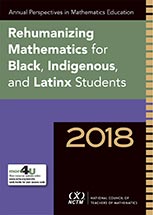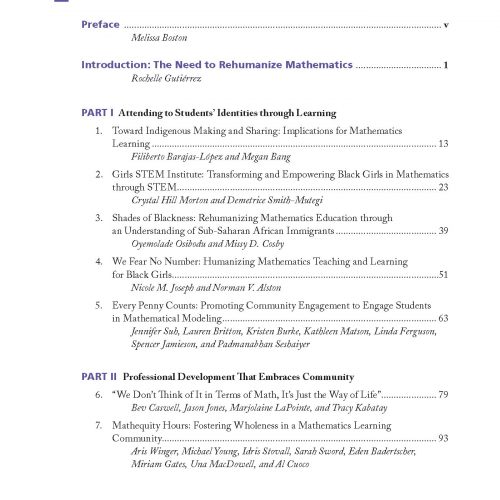Our work is highlighted in the 2018 volume of Annual Perspectives in Mathematics Education (APME), the prestigious publication published by the National Council for Teachers of Mathematics. This volume highlights ways in which mathematics teaching and learning can be a humane, positive, and powerful experience for students who are Black, Indigenous, and/or Latinx.
Bev Caswell and colleagues Jason Jones, Marjolaine LaPointe and Tracy Kabatay, contributed a chapter entitled, “We don’t think of it in terms of math, it’s just the way of life” – a quote by Elder Mike Kabatay during our collaborative work in Treaty #3 territory.


The book is organized into three sections:
- Attending to Students’ Identities through Learning
- Professional Development That Embraces Community
- Principles for Teaching and Teacher Identity
Their chapter highlights the role of Indigenous educational leadership in humanizing the teaching and learning of mathematics and demonstrates the importance of respectful and reciprocal partner relationships in advancing student success. Elders, Indigenous educational leaders, early years teachers, and university mathematics educators/researchers collaborated to design and create a dynamic spatial approach to early geometry instruction.
The chapter describes the rich community connections built through site-based professional development (PD), with a focus on developing young children’s spatial reasoning and geometric thinking.
Building on the work of Lunney Borden (2009), Anishinaabemowin (Ojibwe Language) teachers in the collective highlight the verb-based structure of the language, helping to bring geometric concepts to life. More importantly, this process created space for non-Indigenous teachers to develop awareness and understanding of Indigenous knowledges, histories and perspectives, to spark interest in language revitalization, to connect with communities in meaningful ways through Family Math Parties, and to build new and respectful school-community relationships.
“Mathematics education will never truly improve until it adequately addresses those students whom the system has most failed.”- from the APME website.

